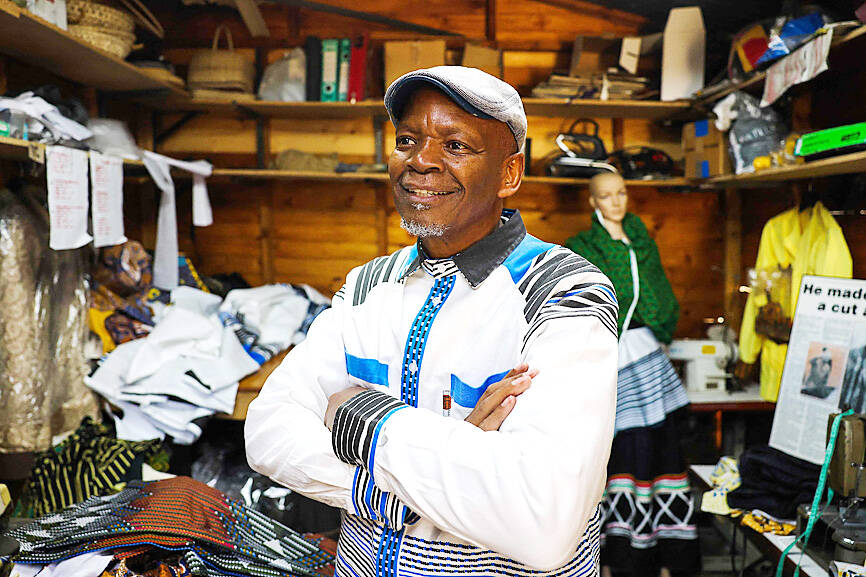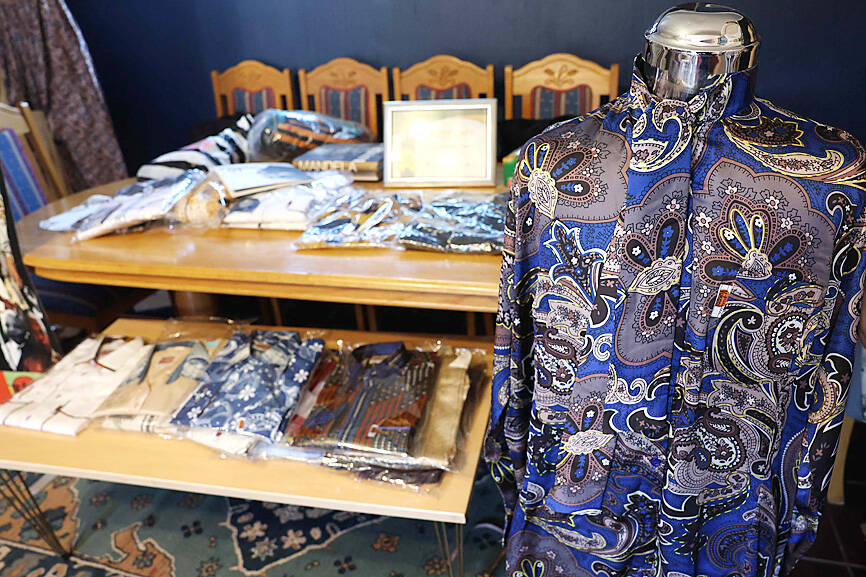In his workshop stocked with piles of fabric and sewing machines, Sonwabile Ndamase is proud that the Madiba shirts he designed for Nelson Mandela 30 years ago endure as a legacy of South Africa’s first democratically elected leader.
Worn untucked and without a jacket, the loose Madiba shirts remain a favorite among South African politicians, making a statement 10 years after Mandela’s death.
Madiba is the clan name by which Mandela became known in South Africa.

Photo: AFP
Ndamase’s clients include South African President Cyril Ramaphosa, as well as former South African presidents Thabo Mbeki and Jacob Zuma. The country’s political and business elite — including ministers, government spokespeople and local politicians — regularly place orders. Even former US president Bill Clinton and boxing great Mike Tyson have a Madiba shirt.
“Anybody who wants to live a Mandela legacy or who wants to live Mandela ethos in life, guess what they are doing? They will go and pick up Madiba shirts,” Ndamase said.
The jovial 64-year-old designer recalls when he was contacted by Winnie Mandela soon after the apartheid government released her husband from prison in 1990. Having spent 27 years in jail, the hero of the fight against white-minority rule and South Africa’s soon-to-be president needed new clothes.

Photo: AFP
Ndamase met Nelson Mandela in his home in Johannesburg’s Soweto.
“He started to tell me that he wanted something that could look conservative enough for him to go and address the captains of industry and ... then also to address the masses without having to change,” he said.
Nelson Mandela wanted a style that would make him stand out among other statesmen and did not require a tie.
The self-taught designer came up with the loose-fitting, casual-but-smart silk shirts with bold patterns that are associated with Nelson Mandela even after his death in 2013 at the age of 95. The shirts often feature oriental-style patterns. Some boast deep colors such as burgundy, dark gray and royal blue, with playful designs; others are of cooler, tan hues, depicting elements from nature such as leaves or twigs.
All are recognizable as the signature Nelson Mandela look. It is a style that Ndamase, who had a mild stroke in March, is passing on to a new generation of garment-makers.
The jocular designer — whose perfect impersonation of Nelson Mandela is a testament to their time spent together — is taking his know-how to New York in September to host a masterclass for young designers.
On the same trip, he plans to showcase his Vukani brand’s new collection at an event for celebrity and elite buyers that is to pay tribute to the 30 years of democracy since South Africa’s first democratic election in 1994.
The collection takes on a more casual, loungewear aesthetic, a breakaway from his usual style, Ndamase said.
The occasion is to feature in a documentary by a US-based filmmaker about Ndamase’s career.
Sporting a gray goatee, Ndamase laughs off the many other designers who claim to have pioneered the Madiba shirt or sell versions resembling his own, which today cost about 1,800 rands (US$100) apiece.
Once described by the late Winnie Mandela as “part of the furniture,” he said never wanted to use the Mandela name for commercial purposes.
“I dressed one generation to another,” he said. “The relationship I had was a family relationship.”

UNCERTAINTY: Innolux activated a stringent supply chain management mechanism, as it did during the COVID-19 pandemic, to ensure optimal inventory levels for customers Flat-panel display makers AUO Corp (友達) and Innolux Corp (群創) yesterday said that about 12 to 20 percent of their display business is at risk of potential US tariffs and that they would relocate production or shipment destinations to mitigate the levies’ effects. US tariffs would have a direct impact of US$200 million on AUO’s revenue, company chairman Paul Peng (彭雙浪) told reporters on the sidelines of the Touch Taiwan trade show in Taipei yesterday. That would make up about 12 percent of the company’s overall revenue. To cope with the tariff uncertainty, AUO plans to allocate its production to manufacturing facilities in

TAKING STOCK: A Taiwanese cookware firm in Vietnam urged customers to assess inventory or place orders early so shipments can reach the US while tariffs are paused Taiwanese businesses in Vietnam are exploring alternatives after the White House imposed a 46 percent import duty on Vietnamese goods, following US President Donald Trump’s announcement of “reciprocal” tariffs on the US’ trading partners. Lo Shih-liang (羅世良), chairman of Brico Industry Co (裕茂工業), a Taiwanese company that manufactures cast iron cookware and stove components in Vietnam, said that more than 40 percent of his business was tied to the US market, describing the constant US policy shifts as an emotional roller coaster. “I work during the day and stay up all night watching the news. I’ve been following US news until 3am

COLLABORATION: Given Taiwan’s key position in global supply chains, the US firm is discussing strategies with local partners and clients to deal with global uncertainties Advanced Micro Devices Inc (AMD) yesterday said it is meeting with local ecosystem partners, including Taiwan Semiconductor Manufacturing Co (TSMC, 台積電), to discuss strategies, including long-term manufacturing, to navigate uncertainties such as US tariffs, as Taiwan occupies an important position in global supply chains. AMD chief executive officer Lisa Su (蘇姿丰) told reporters that Taiwan is an important part of the chip designer’s ecosystem and she is discussing with partners and customers in Taiwan to forge strong collaborations on different areas during this critical period. AMD has just become the first artificial-intelligence (AI) server chip customer of TSMC to utilize its advanced

Six years ago, LVMH’s billionaire CEO Bernard Arnault and US President Donald Trump cut the blue ribbon on a factory in rural Texas that would make designer handbags for Louis Vuitton, one of the world’s best-known luxury brands. However, since the high-profile opening, the factory has faced a host of problems limiting production, 11 former Louis Vuitton employees said. The site has consistently ranked among the worst-performing for Louis Vuitton globally, “significantly” underperforming other facilities, said three former Louis Vuitton workers and a senior industry source, who cited internal rankings shared with staff. The plant’s problems — which have not